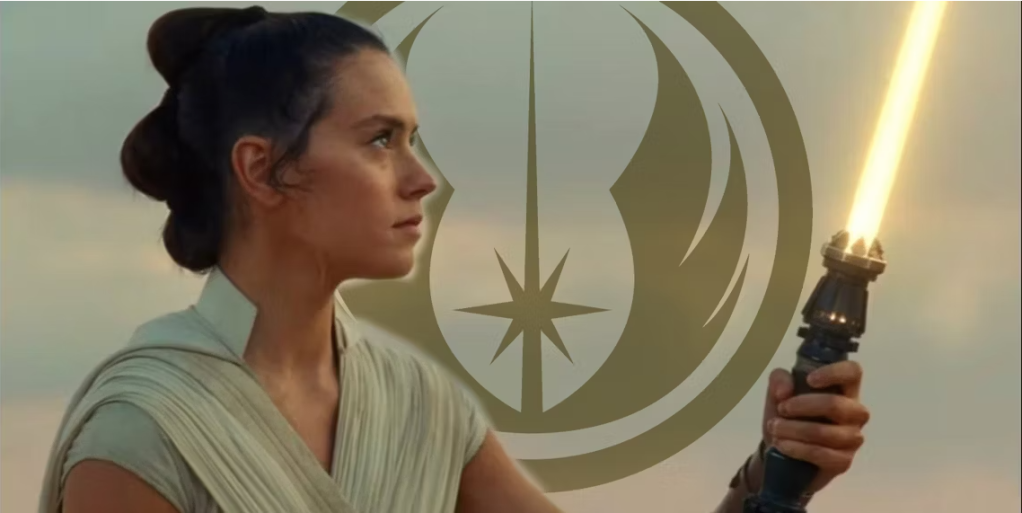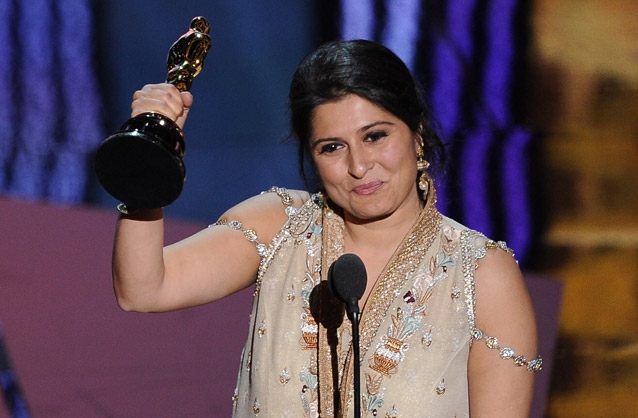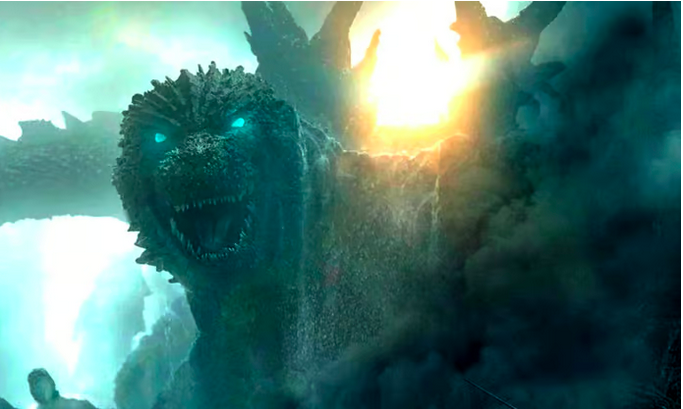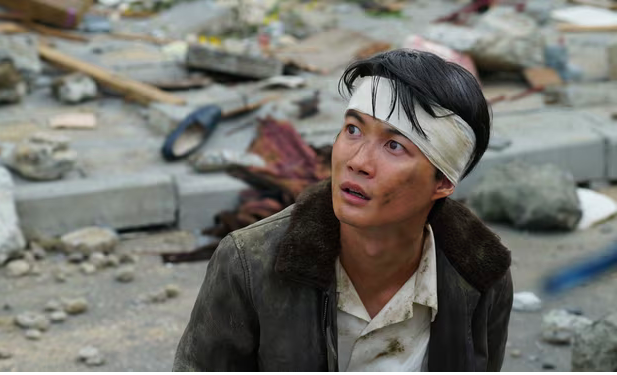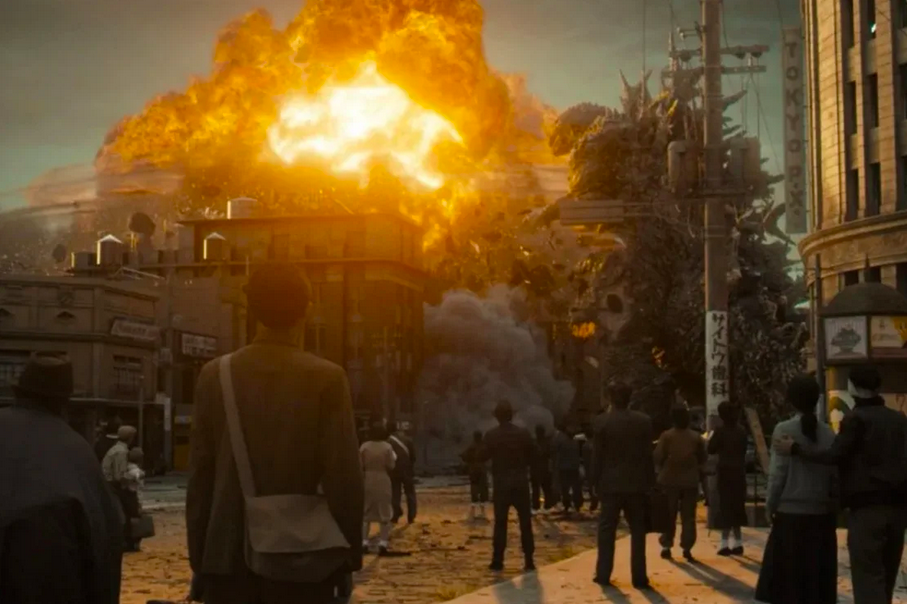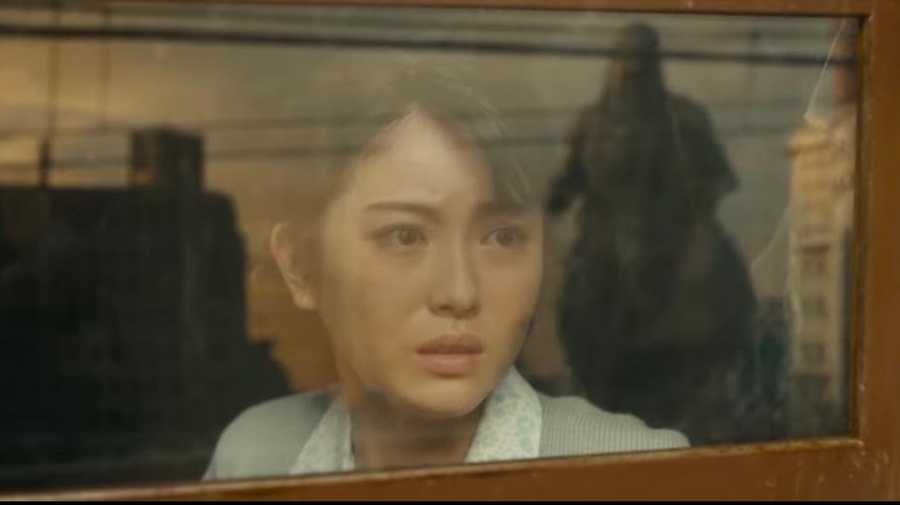Victor writes about STAR WARS (sorta)
Yesterday’s kerfuffle about the director of the latest STAR WARS movie reminded me of this scene from THE MAGNIFICENT AMBERSONS:
This clip ends before we get to the punchline of which I was reminded, when Uncle Jack returns after escorting Eugene out, and says to George:
Well, it’s a new style of courting a pretty girl, I must say, for a young fellow to go deliberately out of his way to try and make an enemy of her father by attacking his business! By Jove! That’s a new way of winning a woman.
I have no stake whatsoever in the STAR WARS INC. products, having seen only the first, second and fourth of the films. But I have some interest in the backlash afoot about the director Disney hired for the next movie in the series. While Sharmeen Obaid-Chinoy’s most recent work includes episodes of MS. MARVEL and an animated series 3 BAHADUR, she won her fame (and two Oscars) as a Pakistan-based journalist making documentaries about the oppression of women and related issues in Muslim countries. A Canadian citizen with degrees from Stanford and Smith, Obaid-Chinoy will be the first woman and the first non-white to direct a STAR WARS film, a fact that naturally was the lead on all the stories and which she herself leaned into.
“We’re in 2024 now, and it’s about time that we had a woman come forward to shape a story in a galaxy far, far away.”
Kathryn Bigelow became the first woman to win the Best Director Oscar by making a war movie and she came up through action and genre films. The best action film I’ve seen in recent years was directed by South Asians (the Tamil blockbuster RRR). John Ford directed two Oscar-winning documentaries. So … there’s plenty of precedent for great action movies coming from biographies, backgrounds and resumes like Obaid-Chinoy’s. Nevertheless, “Pakistani feminist documentarian” doesn’t exactly scream “next STAR WARS movie.” I’ve been accused of hero worship regarding Jean-Pierre and Luc Dardenne, but I’m pretty sure they couldn’t make a STAR WARS movie that the fans would want to see.
The backlash goes beyond mere identity though (if it didn’t, it would be ridiculous and unworthy of other comment). Matt Walsh posted this the other day of Obaid-Chinoy providing a kind of self-manifesto.
I like to make men uncomfortable. I enjoy making men uncomfortable […] It’s only when you’re uncomfortable and have to have difficult conversations that you will, perhaps, look at yourself in the mirror and not like the reflection.
Now this clip is several years old and isn’t specifically talking about STAR WARS or even her work on MS. MARVEL. But personnel is policy and her “about time” words from this week aren’t those of someone who’s backtracked from that way of thinking. And those older words are incredibly shocking to people who didn’t go to Smith or Stanford. And they are, at a minimum, a very bad look for the maker of a commercial film costing hundreds of millions of dollars rather than a crusading journalist (I’m sure her work in that sphere, with which I’m unfamiliar beyond titles and premises, is worthy and important).
I absolutely believe the artists should not pander to the box office. But producers, i.e., the people who hire directors, should worry about the box office. Worrying about the box office is THEIR role. The STAR WARS movies are a commercial product with a huge built-in audience, not an artisanal personal work. Hiring a Pakistani feminist documentarian who says she enjoys making men uncomfortable to direct a film with a pre-existing fan base that is largely male … well, as Uncle Jack would put it, by Jove! That’s a new way of winning an audience!
These sorts of pre-backlashes (and thus arguably baked-in failures, however unjust) happen because people inside the left-culture bubble don’t understand just how they sound to people outside it … which is pretty much what defines a bubble after all. They can’t read an outside room.
Look at that clip again and note how Obaid-Chinoy gets applause for saying she wants to make men feel uncomfortable and goes on in full pedagogic crusader mode, almost like a schoolmarmish Carrie Nation, saying half the human race needs to shut up, agree and obey. And notice how the one male on the stage takes it with meek resignation, like a well-trained housepet. This is a forum where everybody agrees and Obaid-Chinoy says what she does because (ironically) this is NOT a difficult thing to say for her, in this space. (An actually difficult conversation, for most of the people in that room, would spark cancellation calls and intersectionalist anathema sits and accusations of thisism and thatphobia.) But STAR WARS fans are not intersectional feminists. “I like to make men uncomfortable” sounds like sadistic male-hatred to people who have never gone near a women’s studies course. And outside the bubble, the conversation is over and the mind is closed (“you hate men”).
Yet the typical reaction from those who have gone near a women’s studies course and liked it (I’m not linking to the article, which is just hateful snark) is to double down as if disagreement were per se vindication. But if one’s goal is making others uncomfortable, i.e., trolling … I suppose it is.
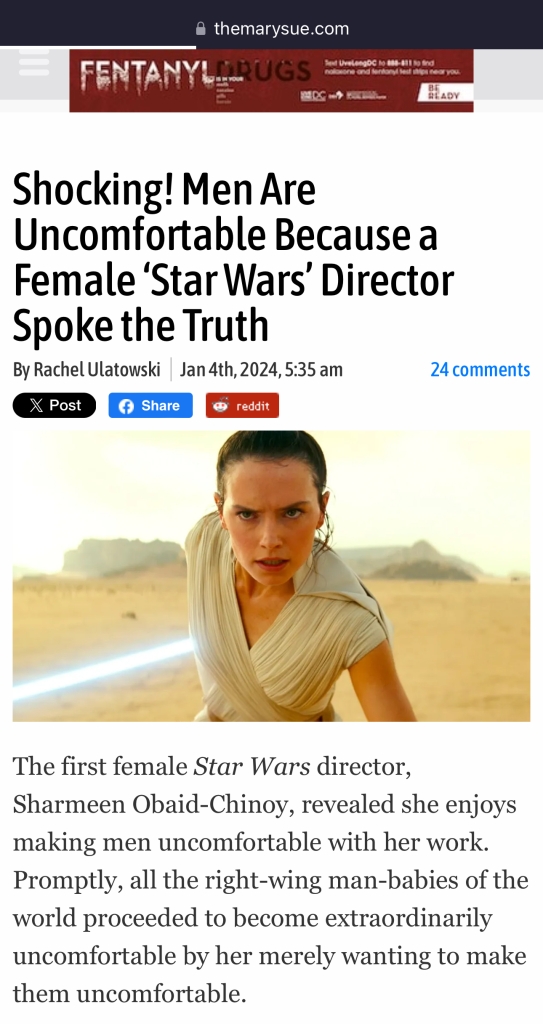
Japan World War II Apologist, redux
As I’ve already written here, I very much liked the new Godzilla movie, and so did the two people with whom I saw it, both Godzilla junkies. Since then I’ve had four independent conversations with non-critic friends about GODZILLA MINUS ONE, all initiated on the specifics by them, the most recent being Monday, and all of them liked it on more or less exactly the terms I describe in my review. And we know the film is generally popular, managing the amazing feat for a live-action subtitled film of being #1 at the box office the week it opened.
In that review, I noted that I jokingly call myself in my Twitter bio a “Japan WW2 apologist.” It’s an in-joke with a friend who called me that (sarcastically himself), because I could not bring myself to care that Miyazaki’s THE WIND RAISES is about a man who designs a fighter plane as a thing of beauty but leaves out all Japan’s WW2 atrocities (a point of criticism at the time, especially among the wokest Americans).
But in Monday’s GODZILLA MINUS ONE conversation with a co-worker, he told me about a dissent that he had read, in National Review. It’s bizarre, he told me. I said “by Armond White then?” (that meant nothing to him). After having now read it, I don’t know if the more bizarre thing is the review itself or the fact it wasn’t by White (I’m unfamiliar with author Michael Washburn).
Washburn does make one good critical point, that it shares a lot of similarities with JAWS, and he adds that here they get a plethora of bigger boats. But something tells me that his concern is more with something else.
My concern is more with the identity of the good guys in this action-adventure. Godzilla Minus One is set in 1946, and the heroes are Japanese soldiers and sailors who vocally resent their defeat in the war and its lasting consequences for Japan’s empire. …
From the opening, when the kamikaze pilot who could not bring himself to do his duty to the empire in the past watches the tragic deaths of his fellow soldiers at the hands of the monster, through the scenes in which Godzilla ravages the mainland, and defeat has deprived the nation of the means to fight back, to the later scenes when an officer who acts as if the war is still going on gives a rousing speech to members of the demobilized fleet, Godzilla Minus One is in the Japanese military’s corner. You might view the monster as the specter of Japan’s wartime enemies, haunting the psyche of a people, crying out for them to summon their heroic virtues and fight.
There’s not nothing here. I wrote in my GODZILLA review that:
Here is a film that, had it been made in … oh, say, 1954 … would have been taken as an apologia for Japanese rearmament and a social reconciliation with war veterans (as well as the obvious A-bomb trauma theme). It’s made explicit in this film that Japan can’t count on the US to defend it and it now needs war veterans and their military expertise to fight Godzilla. Pacifism isn’t an option socially and the human story is a coward recovering his manhood by fighting (I saw this with my MMA coach and his girlfriend).
But some of Washburn’s claims about the film are dubious. It’s not really the case, either in history or in the film, that the Japanese soldiers and sailors “resent” their defeat. They’re definitely humiliated by it and lament the ruin and death all around them, but they don’t “resent” it in the prideful, revenge-seeking sense the Southerners of 1866 or the Iraqis of 2004 did. IRL, the emperor going along with the surrender and retaining authority quelled a Japanese KKK or Fedayeen. In GODZILLA MINUS ONE, the subject just never comes up. The Americans are mentioned only to note their absence and there’s no blaming them for Godzilla, the latter despite the obvious fact that Godzilla was (and always has been in the movies) the product of the A-bomb attacks.
In Japan’s post-WW2 self-mythology, those attacks are an unthinkable metaphysical evil, the equivalent of the Holocaust to us, not something subject to debate (which they are here, and even opponents of them know this). If GODZILLA MINUS ONE were about vanquishing “Japan’s wartime enemies,” you’d expect at least SOME more anti-Americanism than “they won’t help us against Godzilla because they don’t want to upset the Soviets,” starting with something like “the American A-bombs created this beast.”
Indeed, the way I would put it is that GODZILLA MINUS ONE is about reclaiming the heroic virtues, at a very difficult time, in the name of better fights and of fighting better. On the former, these veterans are plainly using their skills to save Japan, not to rape Nanking. On the latter, there are lines about how careless the Empire had been with their lives, putting them in thinly armored tanks and in planes without ejector seats (all this is historically true), and this becomes a major plot point. And also … sets up the final denouement.
But those claims are just a bit misguided. Washburn’s true bizarrerie is the last 70% of the column. Of the piece’s about 1550 words, the 1100 beginning with “By a strange quirk of fate” are not about GODZILLA MINUS ONE or Godzilla movies at all but an essay about a book on Japan’s World War II atrocities. This is literally 2/3 of the piece:
[The Japanese were awful.]
[Rinse and repeat and repeat and repeat…]If a movie came out presenting recently demobilized Wehrmacht soldiers as heroes — and conveying the message that these Nazis may have taken a licking but still had some fight in them — audiences and critics around the world would rightly revile the film as the morally repulsive garbage it would be. Yet, in the face of all that [Gary J.] Bass documents in painstaking detail, Godzilla Minus One has grown into one of the most popular, lucrative, and, one might even say, beloved movies of the decade.
Something’s wrong here.
Yes, something IS wrong here, and it’s this kind of bedwetting-progressive pseudo-pacifism appearing in an American conservative journal.
Joking Twitter bio aside, I have absolutely no problem with noting that the Japanese fought in World War II like uncivilized barbarians indifferent even to their own survival. Or with cinematic depictions thereof, whether by whites (BRIDGE ON THE RIVER KWAI) or by Asians (DEVILS ON THE DOORSTEP). I haven’t read the Bass book that fascinates Washburn, but whatever might be said of its systematicness and/or any specific new details, it really is no revelation during my lifetime that the Japanese fought like uncivilized barbarians. (I have a very vague memory of an extended family member whose name I can’t even recall now, having been broken by Japanese abuse after he was captured in Hong Kong or Singapore.)
But that doesn’t lead to two further propositions: (1) that the Japanese themselves must view their history as the work of uncivilized barbarians; and (2) that every representation of post-war Japan must center on being / having been uncivilized barbarians.
The first is simply a matter of national survival and national pride, two conservative virtues the rejection of which are central to the current Great Awokening. To put it simply and crudely, self-hatred is not a viable national self-image. It’s 1946 Japan … what are you supposed to do, going forward? And “going forward” means “don’t bomb Pearl Harbor” isn’t an answer. You have hundreds of thousands of blood-soaked soldiers and a whole populace that went along with every manner of atrocity.
Short of replacing the population (though keep in mind that this has been the norm of conquest for much of human history), you have to work with the “material” you have. Your only logical alternatives to national self-hate are to invent self-serving evasions — East Germany claimed it was the repository for all progressive elements in German history; Austria retreated into victimology and a kulturcentrism in which Beethoven was an Austrian and Hitler a German. Or you can start at “Year Zero” like the Khmer Rouge. These courses are not recommended, the last “most” of all.
Every self-respecting country needs a usable national story, even about “last week.” By this, I’m not talking about lying about history, and the verb I chose in point (2) was deliberate — “center.” What is the most-important thing, the alpha and omega? The 1619 Project is not awful because, in one of the anodyne euphemisms often used, it “teaches about slavery,” something to which no sane person objects. It is awful because its aim is “to reframe the country’s history, understanding 1619 as our true founding, and placing the consequences of slavery and the contributions of black Americans at the very center of our national narrative.” But a nation cannot respect itself, and will quickly collapse in self-hatred, if [Something Evil] is at its center. This would be an utterly uncontroversial point if applied to an individual. You can’t, for long, think you’re nothing but a sinner. Washburn is peddling the kind of anti-heroic nonsense once expects in Vox, but not in National Review.
Insisting that Japan’s uncivilized barbarism of 1945 is relevant in the face of an objective threat in 1946 (like say a fire-breathing, radiation-spewing giant dinosaur) is the kind of weird moral purism that masks the moral disarmament and practical delegitimization that one expects from the Wokest of the Woke. They are the ones who insist that some Israeli misbehavior(s) is the cause of Hamas’s October 7 massacre. I even remember way back a discussion board in which a leftist, on the night of September 11, fretted about being worried that he had heard somebody reacting to Bush’s speech that evening by yelling in a bar “get them towelheads” (or “Ayrabs” or somesuch). If only the sinless have a right to fight or use and nurture the martial and heroic virtues, then nobody does. Indeed, maybe this IS the hidden point of the bad-faith pacifist— again, a tactic I’d expect from many venues, but not conservatism’s historic flagship journal.
And to grab Washburn’s analogy by the horns, there’d be nothing in principle wrong with a movie about demobilized Wehrmacht soldiers as heroes and having the fight in them needed to preserve (West) Germany. As long as they’re not goose-stepping or Jew-gassing, what would the objection be? Only the mere fact they had been Nazis a few years ago, a group that’d be mighty hard to avoid in 1946 West Germany (or frankly East Germany or Austria either, but that’s another story). Unless a literal ethnic cleansing and population replacement is the remedy, you can only start from where you are and who you were yesterday. If a monster comes to destroy your capital, the fact you were uncivilized barbarians last year only means you shouldn’t fight the monster to those who are Peak Woke. Or in National Review apparently.
